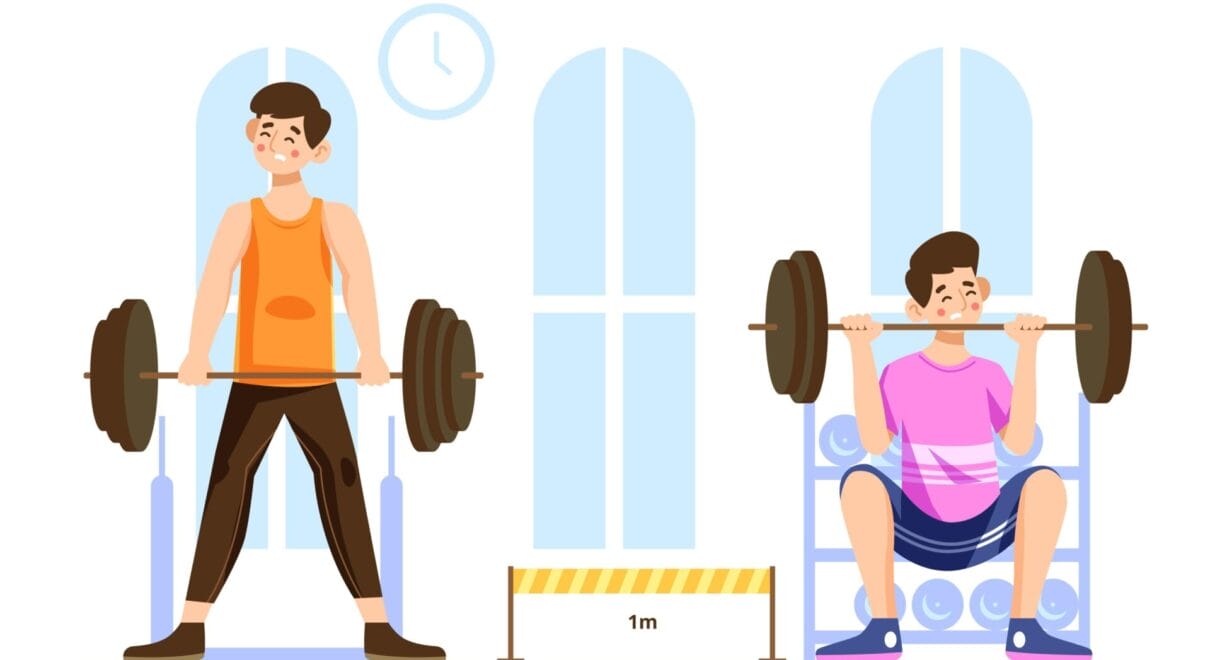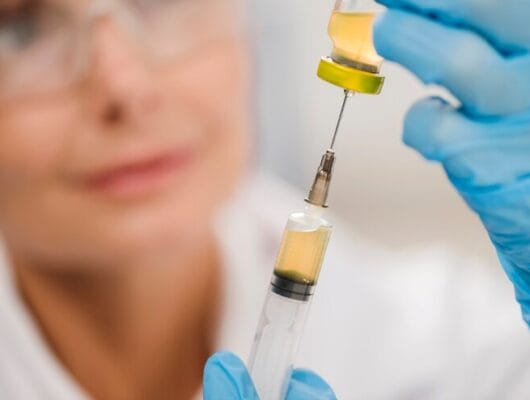Embarking on a journey towards optimal health, men frequently explore diverse paths to tackle weight loss, hormone optimisation, and fertility concerns. A cutting-edge and progressively favoured method in this pursuit is Male Hormone Replacement Therapy (HRT). This comprehensive guide aims to unravel the nuances of male HRT, with a primary emphasis on its impact on weight loss, hormone optimisation for men, and fertility enhancement.
Understanding Male Hormone Replacement Therapy
Male Hormone Replacement Therapy contributes to the administration of hormones to address imbalances and deficiencies that may occur naturally due to age factors or because of many other factors. The primary hormones targeted in male HRT are testosterone, human growth hormone (HGH), and sometimes thyroid hormones.
How do hormones affect male fertility?
Testosterone is crucial for keeping sperm healthy—making sure they’re just right in terms of quality, quantity, and how they move. Getting the balance of hormones right, especially testosterone, is crucial for spermatogenesis. That’s the process of making sperm. If testosterone levels are low, it is tough for someone to have kids.
That’s where Hormone Replacement Therapy (HRT) comes in. It helps to bring hormone levels back to maintain their balance. It is really like a blessing for the people who are suffering from male infertility.
To figure out these tricky issues, it’s really important to understand how hormones and fertility work together.

The Hormones That Drive Male Fertility
Several hormones contribute to the intricate dance of male fertility. In addition to testosterone, follicle-stimulating hormone (FSH) and luteinising hormone (LH) play crucial roles. FSH enables the production of sperm, while LH regulates testosterone production. An imbalance of hormones can disturb the delicate equilibrium required for successful fertility. HRT fertility treatment targets these hormones, seeking to restore balance and enhance the overall reproductive health of men.
Indicators of a hormonal disruption in male fertility
Finding the signs of a hormonal imbalance is essential for early intervention and effective fertility treatment. Symptoms may include changes in libido, erectile dysfunction, fatigue, and alterations in secondary sexual characteristics. Regular monitoring and assessing hormone levels through blood tests can help identify imbalances. Addressing these signs promptly through HRT can potentially alleviate fertility issues and improve overall reproductive health.
Start with a semen analysis to understand Male Fertility.
A semen analysis serves as a foundational step in comprehending male fertility. This diagnostic test evaluates various parameters, including sperm count, motility, and morphology. Understanding the results of a semen analysis provides valuable insights into the health and sperm functionality. Should abnormalities be identified, HRT fertility treatments can be tailored to address specific hormonal imbalances, offering a personalised approach to enhance fertility and increase the likelihood of successful conception.
The Relationship Between Hormones and Weight Loss
The intricate interplay between hormones and weight loss is a dynamic and crucial aspect of male health. As chemical messengers within the body, hormones intricately regulate various physiological processes, including metabolism and fat storage. Unveiling the specific ways hormones influence weight can provide insights into the potential efficacy of Male Hormone Replacement Therapy (HRT) for addressing male weight loss treatment.
The relationship between hormones and weight loss extends beyond mere numbers on a scale. Hormones influence appetite, energy levels, and the body’s ability to burn calories. An imbalance in these hormonal signals can disrupt the delicate equilibrium for successful weight management.
Male HRT programs recognise the significance of a comprehensive approach to hormone optimisation for effective weight loss. Individuals undergoing HRT can experience improved energy levels, metabolic efficiency, and overall body composition by tailoring interventions to address specific hormonal imbalances.
1.1 Testosterone and Metabolism
Testosterone plays a vital role in monitoring metabolism and muscle mass. With age, testosterone levels tend to decrease. Thus, it is leading to weight gain, especially around the abdomen. Male HRT can help restore testosterone levels, aiding in weight loss. Also, it is developing lean muscle mass.
1.2 Human Growth Hormone (HGH) and Fat Metabolism
HGH is another crucial hormone associated with weight management. It stimulates the breakdown of fats and promotes the conversion of these fats into energy. By incorporating HGH into HRT protocols, individuals may experience enhanced fat loss, contributing to a healthier body composition.
1.3 Thyroid Hormones and Metabolic Rate
Thyroid hormones, such as T3 and T4, are pivotal in regulating metabolic rate. Imbalances in thyroid function can lead to weight gain or difficulty in losing weight. Male HRT may include thyroid hormone optimisation for men to address such imbalances and support weight loss efforts. Thus, discover effective male weight loss treatments for a healthier, more vibrant lifestyle.
The Role of Hormone Optimization and Hormone Replacement Therapy in Men’s Well-being
At the forefront of men’s well-being, prioritising hormone optimisation for men becomes a crucial pathway to attain peak vitality. The aging process brings about notable hormonal shifts that substantially influence diverse facets of life—from energy levels and mood to cognitive function and physical prowess. Stepping forward as a proactive measure to counteract these imbalances is Hormone Replacement Therapy (HRT), which centrally concentrates on the optimisation of vital hormones to foster holistic health and well-being.
2.1 Testosterone Optimization
Testosterone is also referred to as the “male hormone” and is essential for various bodily functions. Male HRT programs focus on optimising testosterone levels. It can considerably impact energy levels, mood, cognitive function, and overall vitality.
2.2 HGH Optimization
Human Growth Hormone is crucial for growth, cell repair, and overall well-being. In HRT programs, optimising HGH levels can increase muscle mass, improve recovery, and enhance anti-aging effects.
2.3 Comprehensive Hormone Panel
An individualised approach to HRT involves conducting a thorough hormone panel to assess levels of testosterone, HGH, thyroid hormones, and other relevant markers. This allows healthcare professionals to tailor HRT programs to address specific deficiencies and imbalances unique to each individual.
What Causes Low Testosterone Levels?
Low testosterone levels are due to various factors impacting men’s overall well-being and vitality. Some primary causes include:
Aging: Testosterone naturally declines with age, typically starting in the late 30s or early 40s.
Medical Conditions: Conditions such as hypogonadism, diabetes, and obesity can contribute to low testosterone.
Testicular Injury or Infection: Damage to the testicles or infections can hinder testosterone production.
Chronic Illness: Chronic kidney or liver disease conditions may affect hormone levels.
Understanding the root causes of low testosterone is essential to develop effective strategies to address this hormonal imbalance.

What Are the Symptoms of Low Testosterone Levels?
Identifying symptoms associated with low testosterone is vital for prompt intervention. Common signs include:
Low Libido: A decrease in sexual desire is a hallmark symptom of low testosterone.
Fatigue: Persistent fatigue and a lack of energy can indicate hormonal imbalances.
Erectile Dysfunction: Difficulties in achieving or maintaining an erection may signal low testosterone.
Mood Changes: Irritability, depression, or a general sense of malaise can be linked to hormonal fluctuations.
Recognising these symptoms allows individuals to seek medical advice and explore potential solutions, including Hormone Replacement Therapy (HRT).
Ways to Optimize Testosterone Levels
Optimising testosterone levels involves a multifaceted approach aimed at promoting overall health. Strategies include:
Healthy Diet: Nutrient-rich foods, notably those high in zinc and vitamin D, can support testosterone production.
Regular Exercise: Aerobic and resistance training can help boost testosterone levels.
SoundSleep: Good Quality sleep is crucial for hormonal balance, including testosterone regulation.
Stress Management: Chronic stress can lead to hormonal imbalances, so adopting stress-reducing techniques is essential.
For those with persistent low testosterone levels, Hormone Replacement Therapy (HRT) provides a targeted and effective solution to regain hormonal balance and improve overall well-being.
Hormone Replacement Therapy (HRT) for Male Fertility: A Comprehensive Approach
Fertility is a deeply personal and significant aspect of life, and for men navigating concerns related to reproductive health, Hormone Replacement Therapy (HRT) emerges as a promising avenue for fertility treatment. This specialised branch of HRT aims to address hormonal imbalances that may contribute to fertility issues, offering hope and solutions for those seeking to expand their families.
3.1 Testosterone and Sperm Production
Testosterone plays a vital role in sperm production (spermatogenesis). In cases of low testosterone levels, male fertility may be compromised. HRT can help restore testosterone levels, potentially improving sperm quality and fertility.
3.2 Hormonal Balance and Fertility
Optimising the overall hormonal balance through HRT can positively impact fertility. Balancing testosterone, HGH, and thyroid hormones contributes to a healthier reproductive system, potentially increasing the chances of successful conception.
3.3 Individualized Fertility Protocols
Fertility-focused HRT programs are often tailored to the specific needs of individuals and couples seeking to enhance fertility. These protocols may include lifestyle modifications, nutritional support, and targeted hormone optimisation to address fertility-related concerns.
How Does Hormone Replacement Therapy Work?
Hormone Replacement Therapy (HRT) is a medical intervention designed to address hormonal imbalances in the body, often associated with aging or other health conditions. Understanding how HRT works involves delving into its mechanisms and the specific hormones targeted.
Mechanism of Action:
- Hormone Administration: In HRT, deficient hormones are replaced or supplemented to achieve optimal levels. The most common hormones addressed in male HRT are testosterone, human growth hormone (HGH), and thyroid hormones.
- Customised Treatment Plans: Healthcare professionals tailor HRT programs based on individual needs. This may involve a comprehensive hormone panel to assess baseline levels, allowing for personalised treatment plans.
- Administration Methods: HRT can be administered through various methods, including injections, patches, gels, or pellet implants. The chosen method depends on the specific hormone being replaced and individual preferences.
Target Hormones:
- Testosterone Replacement: For men experiencing symptoms of low testosterone, such as fatigue, low libido, or mood swings, testosterone replacement is a common component of HRT. This helps restore hormonal balance and alleviate associated symptoms.
- HGH Replacement: Human Growth Hormone is crucial in cell repair, metabolism, and overall vitality. HRT programs may include HGH replacement to address age-related declines, promote anti-aging effects, and improve physical performance.
Thyroid Hormone Optimization:
- Imbalances in thyroid hormones such as T3 and T4 can impact metabolism and energy levels. HRT may involve thyroid hormone optimisation for men to address deficiencies and support overall well-being.
The targeted replacement or supplementation of deficient hormones facilitates optimal physiological function. Regular monitoring and customised treatment plans ensure ongoing efficacy. HRT stands at the forefront of advancements in men’s health, providing a nuanced and personalised strategy to enhance well-being and address age-related or health-induced hormonal challenges.
How does HRT help?
HRT extends its benefits beyond addressing age-related concerns to encompass fertility issues in men. Specific fertility challenges that could potentially be alleviated or improved with HRT include:
- Low Testosterone and Sperm Production:
Testosterone is crucial for spermatogenesis, the process of sperm production. Low testosterone levels can hinder this process, impacting sperm quantity and quality. HRT can optimise testosterone levels, potentially improving sperm production.
- Hormonal Imbalances Affecting Fertility:
Imbalances in hormones such as FSH (Follicle-Stimulating Hormone) and LH (Luteinizing Hormone) can disrupt the intricate processes of the male reproductive system. HRT fertility treatment aims to restore hormonal balance, addressing specific issues affecting fertility.
- Addressing Underlying Medical Conditions:
Certain medical conditions, such as hypogonadism, diabetes, or obesity, can contribute to both low testosterone and fertility issues. By addressing these underlying conditions, HRT can provide a holistic approach to improving reproductive health.
- Individualized Fertility Protocols:
HRT fertility treatment often involves personalised protocols, considering the unique needs and circumstances of each individual or couple. This may include lifestyle modifications, nutritional support, and targeted hormone optimisation to enhance fertility.
Beyond its anti-aging benefits, Hormone Replacement Therapy (HRT) offers promise in alleviating fertility challenges for men. Specific fertility issues, such as low testosterone impacting sperm production and hormonal imbalances affecting reproductive processes, can be addressed through HRT. By optimising testosterone levels, restoring hormonal balance, and incorporating individualised fertility protocols, HRT provides a comprehensive solution for those seeking to enhance their reproductive health. As a result, HRT emerges as a multifaceted intervention, advancing not only overall vitality but also offering hope for individuals navigating fertility concerns.

Conclusion
For male health and wellness, Hormone Replacement Therapy emerges as a multifaceted solution, addressing concerns related to weight loss, hormone optimisation, and fertility. As with any medical intervention, it is essential to embark on this journey under the guidance of experienced healthcare professionals.
Hormone Replacement Therapy operates through a thoughtful and personalised approach, addressing hormonal imbalances to improve overall well-being. Beyond its anti-aging benefits, HRT shows promise in supporting men facing fertility challenges, offering a comprehensive solution for those who are seeking to optimise their reproductive health.
The male HRT program offered by RejuvenateHRT serves as an example of a comprehensive and individualised approach to addressing these aspects of men’s health. By unlocking the potential of hormone optimisation, men can embark on a transformative journey toward improved well-being, vitality, and fulfilment.












